Shah Rukh Khan: Dreams, unlimited
India's most-loved superstar has turned 50. Shah Rukh Khan talks about what is arguably the most interesting phase of his career, balancing business sense with artistic instinct, and his dream project


The smell of cigarette smoke accompanies us all the way from the foyer to the elevator and up to the third floor of Mannat Annexe. Shah Rukh Khan is in the building.
Outside, in front of the gate of the sprawling, sea-facing bungalow called Mannat (which, roughly translated, means a wish) in Mumbai’s upscale Bandra Bandstand area, groups of teenagers are busy taking selfies against the famous nameplate. Khan, who turned 50 on November 2, is on a rare day off from shooting—Kajol, the leading lady of his next blockbuster release Dilwale, wanted a break and that forced the megastar to take one as well, something he usually doesn’t like doing. The upside: It enabled him to catch up on much-needed sleep.
As we enter the library where Khan meets visitors, he gets up and hobbles towards us warmly—he is recovering from yet another leg injury. Dressed in a casual blue jersey, blue jeans and matching blue sneakers, Khan has been busy with his Mac, a self-balancing IO Hawk skateboard next to him. Around the room lie empty coffee cups and glasses of water, proof that despite the rare off-day from the sets, the superstar, who has reclaimed his top place in the 2015 Forbes India Celebrity 100 List, has been having a busy day meeting visitors.This promises to be a most interesting phase for Shah Rukh Khan’s career. The actor-turned-entrepreneur—who owns production house Red Chillies Entertainments (which has morphed from the earlier Dreamz Unlimited which he owned with actor Juhi Chawla and director Aziz Mirza), Indian Premier League cricket franchise Kolkata Knight Riders (with friend Chawla and her husband Jay Mehta) and children’s entertainment company KidZania—has decided he will now do not just one, but around three films a year.
The slate of his upcoming films is diverse and will test both his artistic and business acumen. There’s his next release, home production Dilwale directed by Rohit Shetty, with whom Khan made the runaway hit Chennai Express. Then there’s the Rahul Dholakia-directed Raees, a thriller set in Gujarat, which is a co-production with Excel Entertainment of Ritesh Sidhwani and Farhan Akhtar, followed by Yash Raj Films’ Fan, another film Khan is extremely excited about. Khan is also in talks with directors like Aanand L Rai and Gauri Shinde for two other films.
The key here is, Dilwale apart, all the directors Khan is working with belong to the new crop of filmmakers who make movies quite differently from the usual commercial blockbusters that fans have come to expect. And that’s why Khan, who began his acting career doing theatre and has often dabbled in movies which do not strictly fit the regular commercial cinema scheme of things (think Asoka (2001), Swades (2004), Paheli (2005)), is excited.
“But still, the film which all this will ride on will have to be a Dilwale type commercial film," Khan explains. What he means is this: If he has to indulge in the creative satisfaction of doing movies that are different from the usual commercial blockbusters, he will still need that one mega movie a year which will act as a financial cushion. “We will need to balance, else it will be difficult to run a business and I will have to borrow and be at the mercy of distributors," he says candidly. Today, Khan cannot afford to run away and take risks only for his own satisfaction. Hundreds of crores ride on his movies and he has a major production house which also has to run profitably. So, the big movie will always have to be an insurance against the smaller ones. And with Dilwale, Khan has taken a big step forward on the business front by turning distributor.
Today, Khan cannot afford to run away and take risks only for his own satisfaction. Hundreds of crores ride on his movies and he has a major production house which also has to run profitably. So, the big movie will always have to be an insurance against the smaller ones. And with Dilwale, Khan has taken a big step forward on the business front by turning distributor.
“With Dilwale we have turned into distributors ourselves. If we pull this off, then as a company I can get into a position where I don’t need middlemen to tell me what my film should be. No matter how confident I may be, if a distributor tells me, ‘Sir, ye waali chalegi nahin’ [Sir, this one won’t work], it creates a doubt in your mind. You get insecure. You start listening to people in the trade and get waylaid by their opinion."
A CANNY ENTREPRENEUR
Despite the fact that he is almost entirely delegative as a leader and leaves the day-to-day running of all his business interests to his team (Red Chillies is now led by Venky Mysore, a former Sun Life India head, who first came on board with KKR), Khan has a very sharp business mind. Red Chillies has just signed a multi-crore deal with Multi Screen Media (MSM), a Sony arm, for co-production of television, digital and film content. The wide-ranging deal is a benchmark in the Indian film industry and could be a potential game changer. It also means moving Khan’s satellite rights away from the Zee Group, who are also close friends of his. A keen believer in relationships, Khan decided to play a delicate balancing act so that no one was left unhappy.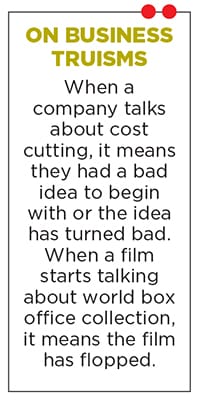 “We had a meeting in this room and my team told me, ‘Let’s open up the movie satellite business and make four to five films and offer them to others, beyond the friends we have normally given them to’. I told them it’s embarrassing to suddenly say we won’t give it to friends, so they said we will play it with decency. The first right of refusal will be with people whom we have worked with for many years. Once they say no, we open it out to the market," Khan explains. So, he sat down with Punit Goenka of the Zee Group and explained things to him and then went ahead to sign the deal with MSM. “It’s also good for them [Zee] because they may not always want to be saddled with the entire slate of three or four movies. But because I am a friend they may hesitate from telling me that."
“We had a meeting in this room and my team told me, ‘Let’s open up the movie satellite business and make four to five films and offer them to others, beyond the friends we have normally given them to’. I told them it’s embarrassing to suddenly say we won’t give it to friends, so they said we will play it with decency. The first right of refusal will be with people whom we have worked with for many years. Once they say no, we open it out to the market," Khan explains. So, he sat down with Punit Goenka of the Zee Group and explained things to him and then went ahead to sign the deal with MSM. “It’s also good for them [Zee] because they may not always want to be saddled with the entire slate of three or four movies. But because I am a friend they may hesitate from telling me that."
In a sense, this balance Khan strikes between personal relationships and business is at the heart of his success. “My team is clear about how to do business, not just go gung ho and be selfish. Be it Venky or Gaurav [Verma, chief revenue officer, who also handles distribution], we want to do well but sensibly. And I still have the right to say no to my team if I feel I am hurting the sentiments of friends for a better commercial deal."
Knowing how long to hang on is also something Khan has mastered, particularly with his cricket franchise KKR. After a poor start, when everyone, including his family, advised him to let the franchise go, Khan decided to hang on just a while longer and things started turning around rather dramatically for the team. Today, KKR is among the top franchises in IPL and has won the championship twice. “I believe that if you stick around [with] a business [for] a little longer than when you think you should give it up, then it turns around." Khan’s business sense revolves around ensuring that his iconic status as a film actor brings in the benefits for his businesses —whether it is the production house or the cricket franchise.“I have this business sense around the three verticals [movies, sports and children’s entertainment], where I feel I need to take a chance. Maybe others can’t do it, but I feel I have reached that level of stardom where I can take a chance. I work hardest on my stardom. That is my core. And that stardom helps build and scale business," explains Khan, who says his business team members are as dedicated to the various verticals in which they operate as he is dedicated to his movies. It is this sense he has of his stardom that also prompted him to pick up the Trinidad and Tobago cricket franchise in the Caribbean Premier League, joining the ranks of Hollywood stars Mark Wahlberg and Gerard Butler.
“In Trinidad and Tobago there is a huge Indian diaspora from UP and Bihar and they love my films. So I had the confidence that for my team, people will come and watch the matches. So yes, I have used the core of entertainment and spawned many businesses around it. I have the confidence that my stardom will add more fans and give the business a chance. In my heart I feel that someday cricket will reach North America. Every fourth or fifth person in the world is an Indian. So you can’t avoid us and this will happen," says Khan.
A FAN OF VFX
One area where the art of cinema merges with craft and business sense is visual effects (VFX), an area Khan is particularly excited about in the context of his business. Red Chillies VFX, which has been at the forefront of special effects in several major Indian blockbusters, from Khan’s own Ra.One (2011) to Hrithik Roshan-starrer Krrish 3 (2013), is currently giving finishing touches to the special effects in Fan, which will take its VFX capability to the next level with some never-seen-before visual effects. In the movie, directed by Maneesh Sharma, Khan plays a young boy, a fan, who resembles the real Shah Rukh Khan, and the visual effects ensure that Khan looks like a younger version of himself all through the film. “The movie was narrated to me in this very room eight years ago. Today I have a company where I can use this technology, where the same actor plays a younger person [with help from VFX] and then plays his age. While other Hollywood movies have done it for much shorter lengths of time, we are doing this for the entire length of the movie—around two and a half hours. To be able to do this in a film will be amazing. Not to look like me and yet look like me." 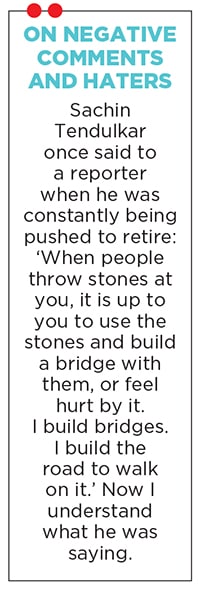 But Khan laments that Indian movie makers are yet to understand that they cannot make do with shoddy VFX at a time when the global movie business has moved to the next level in terms of technology. Good VFX takes time and money, and Khan feels Indian filmmakers need to understand that and not cut corners.
But Khan laments that Indian movie makers are yet to understand that they cannot make do with shoddy VFX at a time when the global movie business has moved to the next level in terms of technology. Good VFX takes time and money, and Khan feels Indian filmmakers need to understand that and not cut corners.
“For a film like Fan, we are taking it to a very different level," he says. “We can do bread and butter stuff, we can remove wires, make people fly and s**t… but with this movie it will showcase the immense talent at the company and a skill-set that is really cutting edge. We are also in talks with Aanand Rai for another film where they want me to play a dwarf. That will require a different kind of technology, a Lord of the Rings technology, equipment and motion capture technique… we plan to do this in India. We are bringing world class quality and equipment here to do international-level work."
Khan says audiences in India, fed on the best Hollywood films, now expect international-level special effects in Indian movies as well. “Indian movie budgets are still low, but I would like to keep earning and upgrading the technology at my VFX company to make sure we are always doing cutting edge work and not just cleaning up wireframes, which is more like back-office outsourced work. We just about break even. Quality is needed, and Indian creative people will need to believe that," he says.
Good quality in VFX will come for a price, he adds. “Quality work needs time and more than time, you need people with the best talent to do it. And the best talent is expensive. You clean up a photo for one hour but to make it the best, it may take three and a half hours. You need to be okay with that. If you don’t give the technical guy the best money, he goes to work for a Harry Potter."Khan says the best Indian talent abroad must be given enough incentive to return and work in India. “It’s a very Swades [a Khan film where he plays a NASA scientist who comes back to India and helps bring electricity to a remote village] thing in a way. You need to be able to attract the best Indian talent to come here and work in India so that we can light the f***ing bulb here. We can launch satellites from here, but you still need to have the best talent working here to do it all in India. And that talent will come and work here only for a price. The difference is 400 times in budgets even today. What we do for $5 million is $50 million there."
Khan says as far as technology like VFX is concerned, India is still fighting a perception battle. “The Indian reputation still is such that Hollywood wants to outsource small work here and not cutting edge stuff. But I have told everyone in my company that we won’t take on projects that are a very small portion or the non-creative part of the movie project. I am very clear that whenever there are special effects in a Red Chillies film, it will have to be of international standards and will set a benchmark and get people used to a certain level."
And VFX cannot be ignored for long, he points out. “It is a part of life in making a movie. But I know it will happen. One day there will be a blowout. You will realise you can’t make a good-looking film without good VFX. Once you get used to a good thing, it becomes a habit. Today you can’t afford to put up mediocre stuff. We are being compared to Hollywood."
“Have you watched Spectre?," Khan asks animatedly. “I get offended when my son and his friends watch Spectre and say the car blew up better than in some of my movies. I have also blown up a Bentley and got it to make eight and a half turns and made it look as real as possible with glass cracks and all. When my kids watch a movie where special effects have not been given enough attention to, they say, ‘Papa…yuck, Papa.’ I tell them, ‘Aryan [Khan’s 18-year-old son] they don’t have much money’. They turn around and say, ‘Then Papa, they shouldn’t do it na?’ My car in Dilwale has to fly better than the one in Spectre!"
‘MAKE MONEY, FOLLOW YOUR HEART’
Khan says he’s somewhat of a Sufi in the way he thinks, far removed from what his movies are or the way people perceive him in real life. “If you read what I write or even what I sometimes say on Twitter… my personal flight of fantasy is vague, weird, different, philosophical, bordering on boring or amazing. It is more like [that of] a Sufi poet. If I use that in my films, chances are I will isolate you and myself from the business I do. 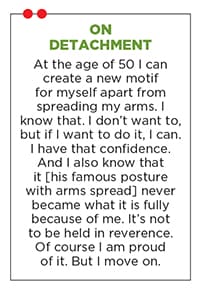 My personal beliefs are very different. I give lectures to my children, they get bored and say, ‘Papa, what are you trying to say?’" he laughs.
My personal beliefs are very different. I give lectures to my children, they get bored and say, ‘Papa, what are you trying to say?’" he laughs.
But a Sufi heart aside, Khan admits he knows when and how to grab an opportunity to make money. “I am not greedy. If I sit with my team, I don’t know when and who is going to pay me, where my next cheque is coming from or how much I am spending on what. I never sit down for accounts. But I know this: If I get a chance to earn some money, then I won’t let go of that opportunity. And by this, I don’t mean for businesses which are established and have a team, gestation period, etc. Here I am talking about my own [work]… if even now I am told that I have to go for a dinner which I will be compensated for, then I will leave everything else to go and do it. To me, this money is not easily earned it’s a lot of hard work. I believe that you have to catch an opportunity before it crosses you, not later."

Even after reaching such dizzying heights of success and wealth, why does he need to do this? “I don’t know what it is… is it greed, insecurity, fear or just a habit now… or [that] I want to buy a plane? Unlike other actors, I cannot just sit and take a day off if there is an opportunity to earn money and invest in my business. Many other actors say, ‘I need my spa.’ I say, screw the spa. There is enough time for that," he says.
“I meet the premiers of the world, I was supposed to meet the Pope. But if there is even a function on some street, I will do it."
In a sense, Khan says the persona he has created and his iconic status forces him to keep running on the treadmill of work and earn money. “People say Shah Rukh Khan shouldn’t do this or that kind or work. I have always said I believe I am not Shah Rukh Khan, I am the guy who works for Shah Rukh Khan and he has told me to keep working. Because the day I become Shah Rukh Khan, then I won’t work for even a minute as Shah Rukh Khan does not need to work. My face sells, I can walk into a place and make money. By that logic I don’t need to work at all. But I feel I need to keep working so that [all] this continues… my face keeps selling."
But even as he keeps moving, he knows the value of following his heart too. That, however, has to be after he has enough material wealth. “So I would tell a youngster: Have a yearning for earning. And once you have earned, however greedy you are, keep a limit. After that, do what makes you happy and what you love to do. Don’t jump into sugarcane production because someone tells you there is money to be made in it. I would never do that. Very early in my career I was told by my friend Vivek Vaswani: Get into a position of choice and then do what you want to do."
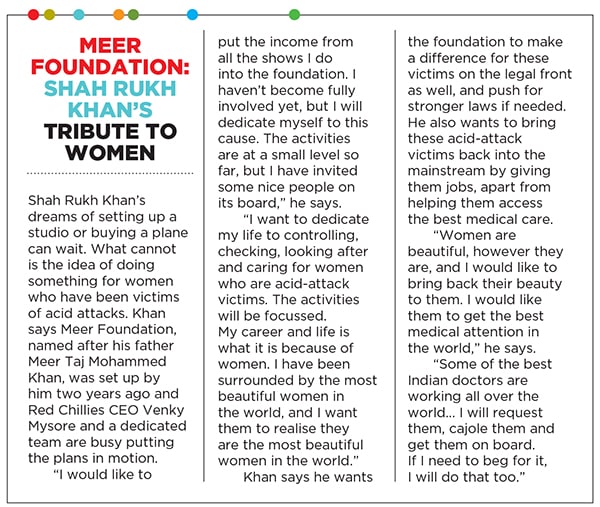
Taking on the world
At 50, Khan still works anywhere around 18 hours a day and eats, breathes and drinks movies. And there are two dreams he nurtures: One of building an international quality studio in India, and the other of making an Indian movie which will wow international audiences.
The studio plan, he admits, is a kind of a “shattered dream".
“We all say ‘Make in India’ these days. Personally, I am passionate about making a great movie studio in India. We have a cinema culture here, so we should also have an international studio here. For now I don’t think any international studio wants to invest and make a brick-and-mortar studio here since it’s not viable for them. I calculated that if we have a studio today which is packed with all slots booked and shifts sold, it will still take 40 years to recover the investment. So it’s not a viable business model for now. It’s unaffordable. Today prices of land in Mumbai are too high. Even if I want to, I don’t think it’s possible to recoup the investments. So at this point, it’s a very shattered dream, but I have this dream."The second is more achievable. “I have an instinctive feeling that before I completely burn out or retire, I will make that one Indian film which the world will see. I don’t know whether it will be as producer, director or actor. I have no clear plan. I have a production company, so it could even be as a producer. I may even want to direct a film."
And that will be an Indian film. “It’ll be better to be the master in my world, which I still haven’t mastered, than to throw myself out into the world [and do a Hollywood movie]. The market is here. I would still feel more proud if I can do a ‘Made in India’ film which becomes international."
He is clear that with the cult status his Indian audiences, and those in the diaspora worldwide, have given him, he will not do a meaningless role in a Hollywood film.
“It’s about the country. I do represent the country at this juncture of my career and stand for an important peg in a cinematic context. It’s an issue of national pride. In western movies, I cannot do work where people in my country feel, ‘Why has he done this?’ That will be letting Indians down. In this country at least 10-11 crore people watch our movies. And I would think, of over one billion Indians, half a billion may know me at least by name."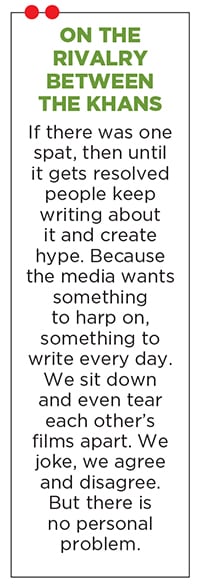
While he is excited about the discussions he is currently having with Bend It Like Beckham director Gurinder Chadha for a possible project, Khan says he’d do a friendly appearance anytime for “good friend" Monica Bellucci. “If Monica Bellucci says, ‘Shah Rukh come and just sit in this scene’, I’d happily do it just for her."
Otherwise, of course, it will have to be a “telling role". “Also, I am 50, I don’t know karate and I don’t know how to dance like [John] Travolta. Unless, of course, there’s a role about a 50-year-old brown man. The chance to do Jungle Book is gone. There I would have played Mowgli. If they make a movie on Mowgli at 50, I am the guy they should take!" says Khan, his sense of humour kicking into play. “Otherwise I’d have to play an Indian doctor or, given the way I look, a villain who plants bombs and runs away. I don’t want to do that."
But haven’t Irrfan Khan and Priyanka Chopra also gone international and done impactful parts, we ask.
“I am not comparing myself with anyone, but I do feel the expectation from me would be higher. The names you mention are of younger people. My consideration at 50 will be different. If I give nine months of mine, I need to come back with something which is on par with what I would have done in India. But that film which the whole world watches, I want to be a part of that Indian film," he reiterates.
And India’s time has come, we point out. Khan adds quickly: “Haan, aur mera bhi. [Yes, and mine too.]"
First Published: Dec 22, 2015, 06:38
Subscribe Now


